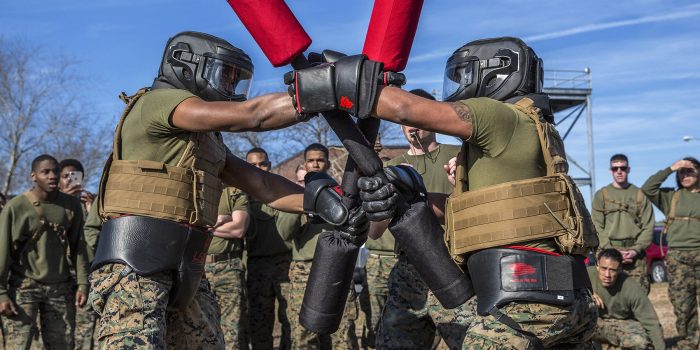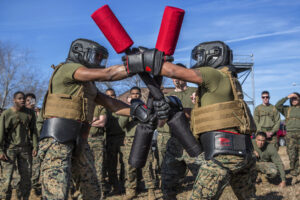Here is the cold hard truth. Young recruits absolutely look forward to their pugil stick fights in basic training. Even if they are a bit apprehensive or fearful, that pugil stick fight has become a rite of passage for most branches of the military and in particular, the United States Marine Corps.
As for myself, I was a young Marine recruit who had just turned 18 about halfway through basic training. I was about 135 pounds soaking wet with a baby face that had the Drill Instructors at USMCRD San Diego wondering if I got lost on my way to junior high. Apart from a few kid scraps growing up, it had been quite some time before I had so much as been punched in the face or threw a punch myself. Yet, here I was on the precipice of earning the title of United States Marine.
When pugil stick training came around, they lined us up by platoons in order of largest to smallest, of which yours truly was near the end. That was to facilitate fairness in the fights to come. Largest would face largest and smallest would face smallest when platoons went head to head. The only problem was that when the opposing platoon ran out of bodies, they started back at the front of the line. Which meant I was about to face one of the largest recruits. So, here’s my story and it ends just like you think it is about to end.
A Blow To The Head By Any Other Name, Is Still A Blow To The Head
Eager to represent my platoon and DIs with all my might, I rushed into the fighting area and didn’t back down one bit. Rather, I was unceremoniously sat down by another recruits blow to the head.
It’s not that I didn’t try to defend or block, but that his strike with perhaps a 70 pound weight advantage cleared through my attempt. Despite the fact that I was “seeing stars” as they call it, I knew I had to get back up and I did.
Despite having lasted about 3 seconds in my first fight, I felt like I had completed this rite of passage. I fared much better in subsequent fights against recruits my size and that was the last time I touched a pugil stick in over 6 years with the Marine Corps.
Now, apart from wounded pride, I don’t have any lingering disability from that welcome to the Marine Corps, though current knowledge of concussions would assume I had one. However, my fond memory of nearly getting knocked out highlights a problem within military and veteran circles. Namely, that we have a tendency to glorify the very things that harmed us.
Most importantly, we feel guilty for blaming what we loved for what we now suffer.
However, that love/hate relationship must not hold us back from pursuing the help to live the life we deserve now. So, let’s explore this relationship a little further.
The Military Experience Is Packed With Things That Will Hurt/Kill Us
Pursuing The Help You Need Today With Modern Medicine Leading The Way
There is no doubt in my mind that if I had walked over to my Drill Instructor after taking a blow to the head and told him that I think I have a concussion, he would have turned me around and put me back in the next fight. Part of me doesn’t blame him as they are training Marines for war. Concussions just were not part of the modern military medicine lexicon at the time, no more than they were in the NFL a little over 10 years ago. Think how many times you watched a NFL player get knocked out and when he was back in the game a few plays later, we lauded his toughness.
Friends, it is the same thing with military service. We are taught to love and respect the very things that hurt us, because we simply didn’t know the science at play like we do now. Granted, I often think it is a crusty DI from the WW2 era that reviews disability claims at the VA who then denies the claim because we’re just being “too soft.”
However, when it comes to concussions, TBI, and other brain injuries, modern science tells us a different story.
Don’t Let Pride Deny Your Brain The Help It Needs
That same premise is true throughout the entirety of your military service. The things we love are indeed
often the things that hurt us. Personally, I loved the hardship of being a Grunt, but not particularly fond of the lower lumbar arthritis I now have at the age of 40. I loved firing weapons, but could do without the ringing in my ears now.
We love what hurts us, but that shouldn’t stop us from getting the help we need to live our best lives today. It doesn’t matter if that was an outmatched pugil stick fight at the start of our military career or the IED that ended it. You deserve the benefits you deserve and Valor 4 Vet stands firm behind their commitment to make sure you get it. Don’t let pride hold you back. Reach out for help.







